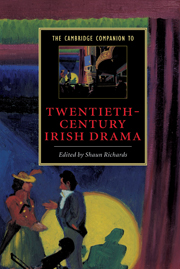Book contents
- Frontmatter
- 1 Plays of (ever) changing Ireland
- 2 Late nineteenth-century Irish theatre: before the Abbey – and beyond
- 3 The ideology of the Abbey Theatre
- 4 The theatre of William Butler Yeats
- 5 Lady Gregory’s Abbey Theatre drama: Ireland real and ideal
- 6 J. M. Synge, ‘national’ drama and the post-Protestant imagination
- 7 On the siting of doors and windows: aesthetics, ideology and Irish stage design
- 8 Oscar Wilde and the politics of style
- 9 George Bernard Shaw and Ireland
- 10 Sean O’Casey’s Dublin Trilogy: disillusionment to delusion
- 11 Ireland’s ‘exiled’ women playwrights: Teresa Deevy and Marina Carr
- 12 Samuel Beckett and the countertradition
- 13 Brian Friel’s sense of place
- 14 The Field Day Theatre Company
- 15 Tom Murphy and the children of loss
- 16 Reconstructing history in the Irish history play
- 17 The Abbey Theatre and the Irish state
- 18 Staging contemporary Ireland
- 19 The Revival revised
- Guide to further reading
- Index
- Series List
16 - Reconstructing history in the Irish history play
Published online by Cambridge University Press: 28 May 2006
- Frontmatter
- 1 Plays of (ever) changing Ireland
- 2 Late nineteenth-century Irish theatre: before the Abbey – and beyond
- 3 The ideology of the Abbey Theatre
- 4 The theatre of William Butler Yeats
- 5 Lady Gregory’s Abbey Theatre drama: Ireland real and ideal
- 6 J. M. Synge, ‘national’ drama and the post-Protestant imagination
- 7 On the siting of doors and windows: aesthetics, ideology and Irish stage design
- 8 Oscar Wilde and the politics of style
- 9 George Bernard Shaw and Ireland
- 10 Sean O’Casey’s Dublin Trilogy: disillusionment to delusion
- 11 Ireland’s ‘exiled’ women playwrights: Teresa Deevy and Marina Carr
- 12 Samuel Beckett and the countertradition
- 13 Brian Friel’s sense of place
- 14 The Field Day Theatre Company
- 15 Tom Murphy and the children of loss
- 16 Reconstructing history in the Irish history play
- 17 The Abbey Theatre and the Irish state
- 18 Staging contemporary Ireland
- 19 The Revival revised
- Guide to further reading
- Index
- Series List
Summary
In a 1983 article the critic Lynda Henderson offered an acerbic critique of the fascination with history which is a hallmark of much contemporary Irish playwriting. 'A concern for history', she wrote, 'is a perverse desire to remain fallen, to make no attempt to rise, to spend your life contemplating your navel . . . Too many contemporary Irish plays bleat plaintively of old wounds.' While Henderson's remarks are particularly damning, she is hardly the first commentator to draw attention to the preoccupation in Irish culture with Ireland's traumatic past. It was Stephen Dedalus, after all, who (in Ulysses) described history as the nightmare from which he was trying to awake. Yet Henderson's worry is that recent Irish dramatists are determined to remain asleep: in her view too many keep their gaze stubbornly arrested backwards, like Walter Benjamin's famously retrospective angel of history. It will be the aim of this chapter to suggest something quite different about the Irish history play, a genre which contemporary Irish writers have indeed made their stock in trade. Examples abound: Brian Friel has written about the 1601 Battle of Kinsale in Making History (1988); about the mapping of Ireland by colonial forces in Translations (1980); and about the horrific events of Bloody Sunday, 1972, in Freedom of the City (1973). Tom Murphy has dramatized the Irish potato famine in Famine (1968); Stewart Parker’s Northern Star (1984) concerns the 1798 uprising; the list goes on. This is hardly surprising. Ireland’s blood-stained history provides dramatic material aplenty, and it is a rare Irish author who opts to disregard it altogether.
- Type
- Chapter
- Information
- The Cambridge Companion to Twentieth-Century Irish Drama , pp. 218 - 230Publisher: Cambridge University PressPrint publication year: 2004
- 2
- Cited by



